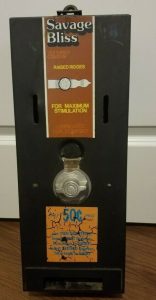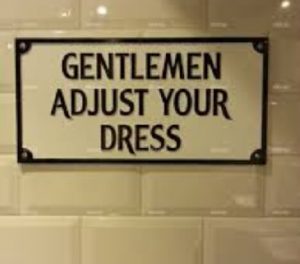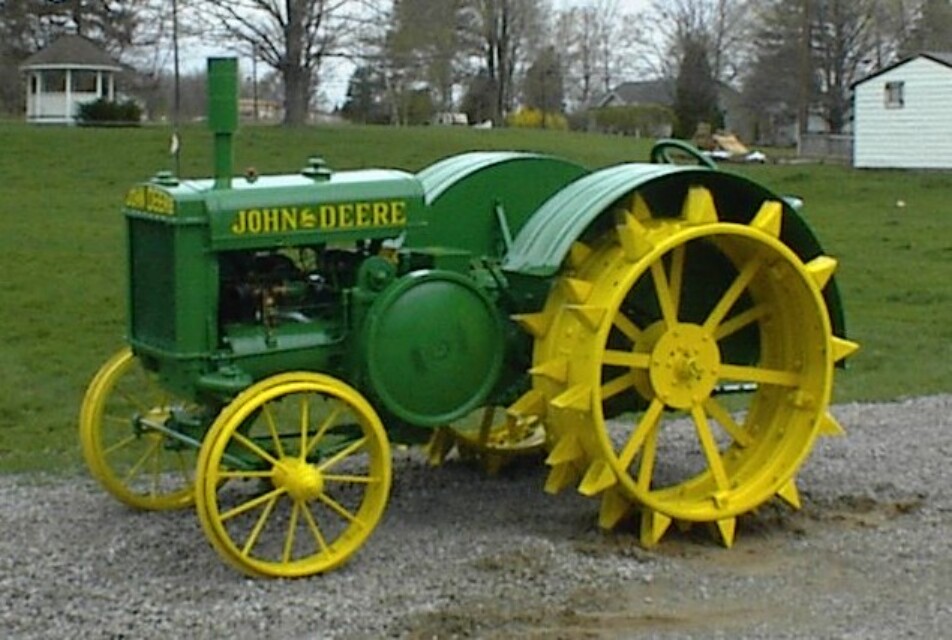In the first part of Gentleman Farmer I told how when I was ten and then eleven years old, I spent two happy summers at my Uncle Bert’s farm in Michigan. I traveled there by myself, the first year by train, the second year by air. Late every summer, Bert drove back to New Jersey with his own family to visit his mother, brothers and sisters, and I came back to Jersey with them.

The Pennsylvania Turnpike was still under construction, so the trip was not yet an easy, all-four-lane-highway one. It was over six hundred miles, so I imagine we stopped somewhere overnight, but I don’t remember that part. During one return trip, I spotted a tall, coin-operated vending machine in a gas station men’s room. It wasn’t clear to me what was being vended, so I asked Bert. He just laughed and said “Never mind, let’s go.” Another men’s room had a confusing sign next to a full-length mirror at the exit; it said “Please adjust your dress”. Before I could even ask, Bert said it meant “Make sure your fly is closed”. Why not just say so?

During my first visit, I mailed my mother a map of the farm, showing the creek that ran across it, the house, the barn, the garden, and a cloud-shaped blob labeled “razzberries”. It also showed where my cousins and I were surprised by a blue racer snake. I saw that map somewhere around here a year ago, but when I looked for it just now to put on this page, it had gone missing. Stay tuned. (April 23 – okay, found it, posted at Gentleman farmer, part 3: lost map found. Enjoy.)
In the barn there were cats, household junk, and farm tools including my favorite, a post-hole digger. Because they lived beyond county garbage collection routes, they buried their organic garbage in rows parallel to those of their vegetable garden. In time, a garbage row decays into the rich soil of a vegetable row, gets planted with seeds, and the cycle continues. I learned to use the post-hole digger, and enthusiastically lengthened the current garbage row until Aunt Evelyn said it was long enough for now. They burned their trash in a shallow ditch around the stump that doubled as the chicken-execution block.
I think they owned a radio, but I don’t remember ever hearing any music in the house. Naomi had a violin that was probably rented through her high school band program, but she wasn’t in love with it – I never heard her play it, or even saw it out of its beat-up case.
There was a dinnertime rule that you had to eat everything that was put on your plate. I don’t think it was Bert’s rule, he was too kindhearted for that; I think it was Evelyn’s. Maybe surviving the Depression had made her that way. There was no such rule back home, and I had a hard time with it, sometimes sitting at the table by myself long after dinner, trying to choke down what still remained. Evelyn was not a great cook — I remember in particular leather-like pork chops, and brussels sprouts, always brussels sprouts.
(I mentioned Evelyn’s rule, and how unjust it was, to one of my sons. He said “What?! You did that!” I told him he was crazy, I never did anything like that. Thinking about it now, I know I did say at times, but not all the time, “No dessert until you finish what’s on your plate”. But that’s not the same thing, nope. Pretty sure.)
Someone decided the house needed a fresh coat of paint, and one hot July day the project began. There were ladders and plenty of brushes in the barn, and my cousins made sure that I was provided a brush and a bucket of paint, the same as them. Painting was easy, and I was good at it. Thinking of the time I helped my father and his friend paint a lady’s beach bungalow, I just slapped it on.
Where there are barn cats there are bound to be kittens, and when Virginia inspected the latest litter, she saw one that looked like it wasn’t breathing. She went into her ER-nurse mode, putting her mouth over the creature’s muzzle and giving it tiny puffs of air, stopping at intervals to check for results. She did her best, but it was too late.
There wasn’t much to do in Temperance, it was as rural as it gets. Up at the next corner, about a 10-minute walk away, there was a gas station with a grocery store that had candy and comic books. I sometimes was sent there to pick up milk or whatever. I don’t recall ever going into “town”, if there was a town, unless you count going to the feed store. A charitable organization, maybe the Kiwanis, got the idea of having a movie night to give the local kids something to do. There was an empty lot behind the grocery store and that’s where they set up the screen. People brought blankets and folding chairs and waited for the dark. Once it was, they started the projector. Every moth and other flying insect in Monroe county spotted the light, and collected in dense bug clouds around both the projector and screen. Disgusted moviegoers began grabbing their blankets and heading home. I don’t know if anyone stayed for the whole show; we were among the first to recognize a bad idea and bail out.
One day Bert took us to Lake Erie to go swimming. It was a pretty long drive, not one you’d want to do every day. On the way, he had to slam on his brakes to avoid another car, and my throat hit the top of the front seat; no seat belts then. It was like getting punched in the voice box; I couldn’t make a sound. It seemed like a long while before I could breathe. No one noticed my difficulties; I think they were all too upset about the almost-accident and about Bert cursing. I just took in small gasps until my breathing came back. Once we got to the lake, nothing of note happened, except for my being disappointed that even lying flat on a blanket, you cannot see up inside ladies’ bathing suits. The skirts have matching underwear underneath.
Bert made the back field of his property available to a neighboring farmer, who planted it with wheat. After the neighbor harvested the grain each year, he brought Bert the baled-up remaining straw, to use on the floor of the chicken coop and as chicken bedding.

One day Bert walked me across the creek into the field, where there was a tractor parked. It wasn’t Bert’s, it was the neighbor’s. We hooked it up to another piece of farm equipment and pulled it up and down the rows. The tractor didn’t have a steering wheel; it steered by pushing left and right foot pedals, Bert let me try steering when we got to the end of one row, but I didn’t have enough weight and leg strength to push the pedals hard enough to make a good turn.
After the field was finished, we drove past the house and onto Dean Road to return the tractor. Alongside the road there were signs that said “NO LUGS”. I’d only seen that word before in the comics, used to describe large, dim-witted people, and I asked about it. Bert said some tractors still used steel spikes, called lugs, instead of rubber tires, and the spikes would tear up the highway. Anything with lugs had to drive on the shoulder.
